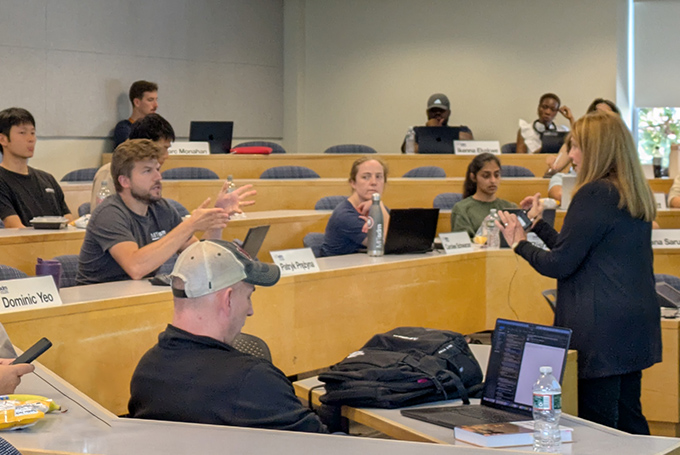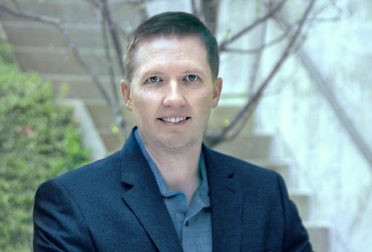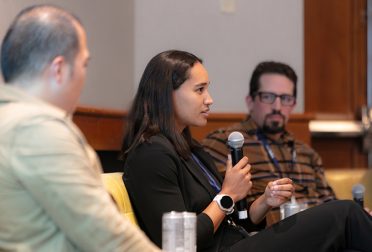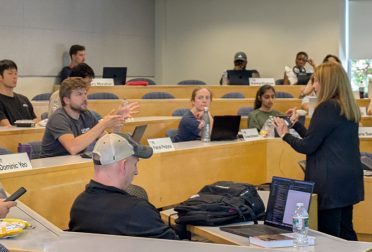By Stefanie Koperniak
This semester marks the start of SDM’s new thesis course, which grew out of an optional seminar the program had previously offered. Developed by Donna Rhodes, principal research scientist in the Sociotechnical Systems Research Center and George Lordos, research scientist in the Engineering Systems Laboratory, the course includes assignments and lectures aiming to build skills critical to planning, conducting research, and writing a thesis.
“The goal is for students to come away with a deeper understanding of academic integrity,” says Rhodes. “We want to give them hands-on experiences and skills that will make them more comfortable with the process of writing a thesis.”
The class has students focus on a mock thesis topic, not the topic they will ultimately select.
Sessions include faculty talks about their research areas and SDM theses they have advised, lectures introducing selected research methods, and a panel of students providing their perspectives on thesis work. The course will culminate in the participants presenting clear, concise descriptions of their mock thesis topics.
Lordos brings to the course his experiences as a graduate of SDM and of the AeroAstro doctoral program, and also a thesis advisor, lead author of papers and a book chapter, and mentor to multiple NASA competition teams. He says that his own experience writing his SDM thesis happened to be a smooth one, possibly because he likes writing. As an advisor, however, he noticed some students struggling with the writing process.
“I’m hoping that through this seminar we can provide scaffolding for students to become accomplished academic writers,” says Lordos. “We want to empower students with all the tools they will need to enjoy the journey of writing a thesis.”
While the seminar had been available in the past, not all SDM students had taken it, in part due to some distinctive characteristics of the program. SDM students traditionally complete the program in two years, but some might be in the program longer, because they are working part-time or might take a semester off. Some students might be required by their sponsor—such as a company or military organization—to complete the degree in a more accelerated timeframe. Others may have opted not to take the seminar and to think more about the thesis later in their journey.
The new course offers credits towards the degree and comprises in-person lectures, with distance students joining via Zoom. The course is offered in the fall, with some portion of it to be offered again in the spring. Students are able to access a Canvas website with the lectures, thesis manual, and other important resources—all assembled together in one place.
Another prominent feature of the SDM program is the diversity of thesis topics, reflecting the wide variety of backgrounds and interests of the students. All SDM topics, in some way, link to systems thinking.
“Since it’s a systems program, we’re driven more toward what would be called ‘hybrid’ research methods,” says Rhodes. “Rather than purely quantitative that you might find in hard sciences or purely qualitative that you might find in social sciences, we’re often working in the middle—either weighted a little bit more quantitative or a little bit more qualitative. SDM students really need to know about both.”
Rhodes says that SDM theses tend to be impact-driven, focusing on tangible challenges, and often involve interaction with stakeholders as part of the research. The course teaches students how to approach these problems by conducting academic research with human subjects, including using surveys or interviews effectively, as well as gathering and analyzing data.
“Because our students come to us with professional experience, they often have very strong ideas about things they want to contribute or implement,” says Rhodes. “We want them to draw from their experience, but also put opinions aside and focus more on the data and knowledge that they acquire in their investigation. I view it as kind of a switch that needs to be flipped. Until they get to that point, they’re not able to make as much progress as they need to make in their work.”




